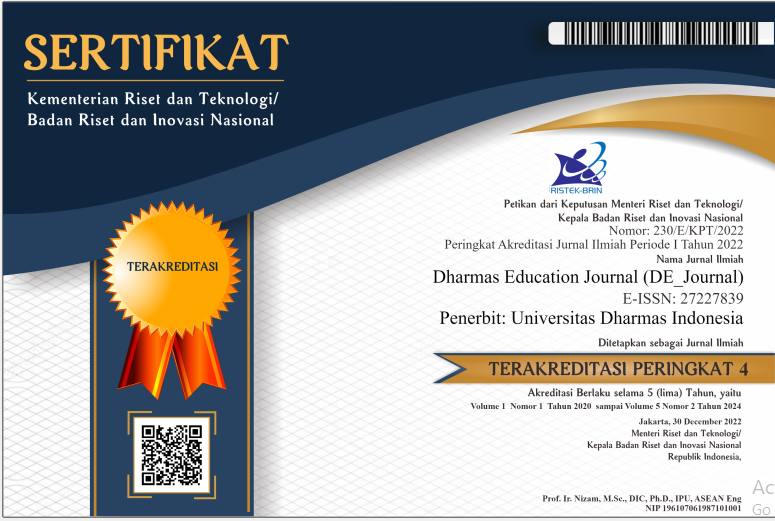Implementasi Program Sekolah Menulis dalam Mengasah Efikasi Diri Melalui Persuasi Verbal Santri di Pesantren Putri Walisongo Cukir Jombang
DOI:
https://doi.org/10.56667/de_journal.v6i2.1877Keywords:
Writing School, Self-Efficacy, Verbal persuasion.Abstract
This study aims to describe the implementation of the writing school Program in honing the self-efficacy of students through verbal persuasion in Pondok Pesantren Putri Walisongo Cukir Jombang. This study uses a descriptive qualitative approach to the method of data collection through observation, interviews, and documentation. The results showed that this program effectively increases the confidence of students in writing. This is indicated by the increased self-efficacy of students after obtaining consistent verbal support from teachers and peers, as well as a supportive learning environment. The Program also facilitates the improvement of critical thinking skills, writing Systematics, and good use of language. However, there are obstacles such as limited facilities and infrastructure, lack of reference book collection, and lack of access to supporting technology. These findings emphasize the importance of the role of teachers and peers in providing constructive verbal persuasion to improve students ' self-efficacy, especially in writing skills.
Downloads
References
Al-Qu$r’an Karim. 2010. Mu$shaf Madinah. Bandu$ng: JABAL.
Bandura, A., & Wessels, S. (1997). Self-Efficacy. Cambridge University Press.
House, J. S. (1983). Work Stress and Social Support. Addison-Wesley Series on Occupational Stress.
Kibtiyah, A. (2021). Efikasi Diri Akademik (Sebuah Model Untuk Menumbuhkan Efikasi Diri Akademik Peserta Didik. CV Amerta Media.
Madinah, M. (2010). Al-Isra : 84. JABAL.
Maimanah, A. C., Munib, A., Latipah, E., & Subaidi, S. (2022). Menumbuh-Kembangkan Minat, Efikasi Diri, dan Regulasi Diri pada Anak. Jurnal Buah Hati, 9(1), 27–43.
Pajares, F. (2003). Self-Efficacy Beliefs, Motivation, and Achievement in Writing: A Review of The Literature. Reading &Writing Quarterly, 19(2), 139–158.
Prihastyanti, I., & Sawitri, D. R. (2020). Dukungan Guru dan Efikasi Diri Akademik pada Siswa SMA Semesta Semarang. Jurnal Empati, 7(3), 867–880. https://doi.org/https://doi.org/10.14710/empati.2018.21740
Salahuddin, A., Sari, F. I., Vinola, D. O., & Prananda, G. (2025). THE MULTICULTURAL VALUES IN THE NOVEL “ 99 CAHAYA DI LANGIT EROPA ” AND THEIR APPLICATION IN LITERARY EDUCATION. Scaffolding: Jurnal Pendidikan Islam Dan Multikulturalisme, 7(1), 776–790.
Satoni, D., & Komariah, A. (2017). Metode Penelitian Kualitatif. Alfabeta.
Sugiyono. (2019). Metode Penelitian Pendidikan Pendekatan Kuantitatif, Kualitatif, dan R&D. In Bandung: Alfabeta.
Usher, E. L., & Pajares, F. (2008). Sources of Self-Efficacy in School: Critical Review of The Literature and Future Directions. Review of Educational Research, 78(4), 751–796.
Yusuf, M. (2015). Metode Penelitian Kuantitatif, Kualitatif & Penelitian Gabungan. Prenada Media Group.
Downloads
Published
How to Cite
Issue
Section
License
Copyright (c) 2025 Dharmas Education Journal (DE_Journal)

This work is licensed under a Creative Commons Attribution-NonCommercial-NoDerivatives 4.0 International License.
Makalah yang disampaikan diasumsikan tidak mengandung bahan propietary yang tidak dilindungi oleh hak paten














